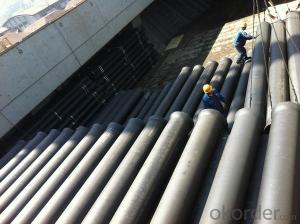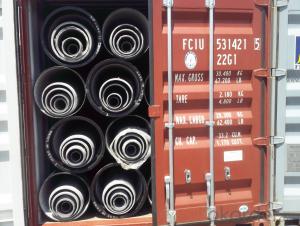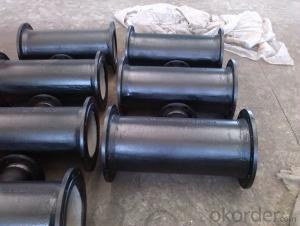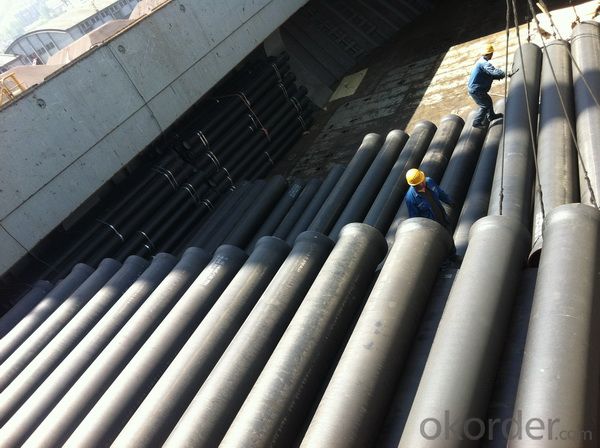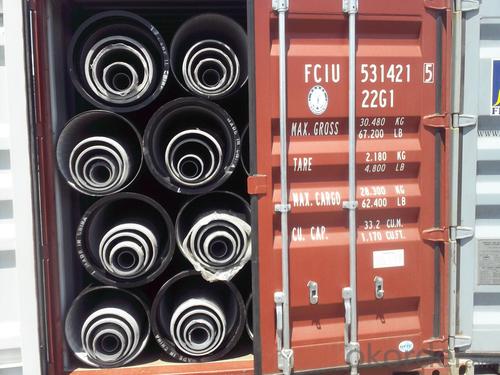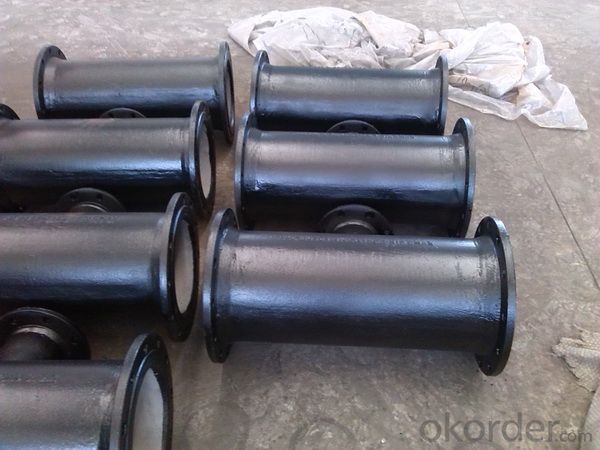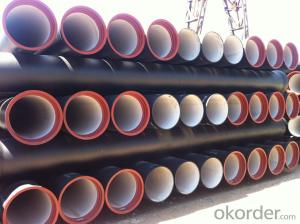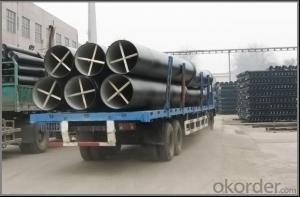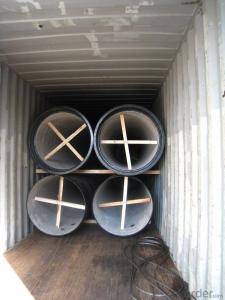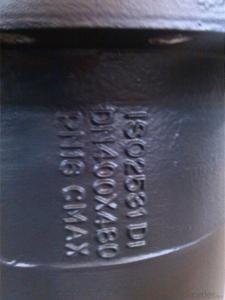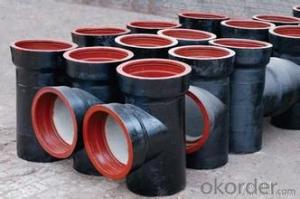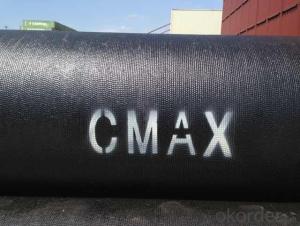DUCTILE IRON PIPE DN1000 k7
- Loading Port:
- Tianjin
- Payment Terms:
- TT OR LC
- Min Order Qty:
- -
- Supply Capability:
- 30000Tons m/month
OKorder Service Pledge
OKorder Financial Service
You Might Also Like
CNBM ductile iron pipe ranges from DN80-DN1600mm (T-Type, Class K9), effective length 6m, comply with ISO2531 Standard
Company Profile
CNBM International Corporation is the leading production base and renowned supplier of Ductile Iron Water Pipe systems of both potable and waste water in China. We are constantly looking to develop high quality products to ensure the longest service life and wonderful performance.
CNBM Pipelines regard quality as the essential factor leading to successful business. Every pipe is tested in accordance with BS EN545 (water application) or BS EN598 (sewer application). CNBM Pipelines products comply with and are tested according to the relevant European and International Standards. Our pipes are manufactured under the quality management system BS EN ISO 9001. After years of efforts, CNBM Pipelines has built up great reputation in terms of quality and service among customers worldwide
Product Introduction
CNBM ductile iron pipe ranges from DN80-DN1600mm (Tyton, T-Type, Class K7/K8/K9), effective length: 6m, complying with BS EN545/EN598/ISO2531/BS4772.
Specification& Payment terms
Internal lining: Pipes shall have an internal cement mortar lining in acc with ISO4179.
External coating: Pipes shall be externally coated with metallic zinc spray plus a further layer of resin painting to ISO8179.
Gasket: 100% SBR/NBR/EPDM gasket in accordance with ISO4633.
Packing: Pipes from DN100 to DN300 be bundled with steel belts, the others are in bulk.
Payment term: By 30% T/T advance payment + 70% Irrevocable L/C at sight.
Packing: In bulk vessel or in container.
- Q: How does ductile iron pipe perform in high-pressure gas applications?
- Ductile iron pipe is an excellent choice for high-pressure gas applications due to its unique characteristics and properties. Firstly, ductile iron pipe is known for its high tensile strength, which allows it to withstand the high pressure exerted by gas flowing through the pipeline. This strength ensures that the pipe can safely contain the gas without any leakage or rupture. Moreover, ductile iron pipe has a high resistance to corrosion, making it suitable for gas applications where the pipeline may come into contact with moisture, chemicals, or other corrosive substances. This resistance to corrosion ensures the longevity of the pipe and minimizes the risk of any damages or failures that could be caused by corrosion. Another advantage of ductile iron pipe in high-pressure gas applications is its ability to handle thermal expansion and contraction. When gas is transported at high pressures, there can be significant temperature variations, leading to expansion and contraction of the pipeline. Ductile iron pipe's flexibility allows it to accommodate these changes without causing any structural issues or compromising its performance. Furthermore, ductile iron pipe has a smooth interior surface, which reduces friction losses and pressure drops, allowing for efficient gas flow. This smoothness also minimizes the chances of gas impurities or debris getting trapped, which could potentially cause blockages or flow disruptions. In summary, ductile iron pipe is a reliable and durable choice for high-pressure gas applications. Its high tensile strength, corrosion resistance, ability to handle thermal expansion, and smooth interior surface all contribute to its excellent performance in such demanding conditions.
- Q: Are ductile iron pipes suitable for pressure reducing valve stations?
- Yes, ductile iron pipes are suitable for pressure reducing valve stations. Ductile iron pipes have excellent strength and durability, making them capable of withstanding high pressure conditions. They also have good corrosion resistance, which is essential for long-term reliability in a pressure reducing valve station.
- Q: How are ductile iron pipes protected against interior corrosion?
- Ductile iron pipes are protected against interior corrosion through a process known as cement mortar lining. This involves applying a layer of cement mortar to the interior surface of the pipe. The cement mortar acts as a protective barrier, preventing the corrosive elements in the water or fluid from coming into direct contact with the iron material. To apply the cement mortar lining, the interior surface of the ductile iron pipe is first prepared by removing any loose scale or debris. Then, a cement mortar mixture is prepared by combining cement, sand, and water to form a paste-like consistency. This mixture is then applied to the pipe's interior surface using a spinning machine or manually by skilled workers. Once the cement mortar lining is applied, it is left to cure for a specific period of time, typically around 24 hours. During this curing process, the cement mortar hardens and forms a dense protective layer on the pipe's interior surface. The cement mortar lining offers various benefits in protecting ductile iron pipes against corrosion. It provides a smooth and continuous surface that prevents the water or fluid from directly contacting the iron material, reducing the risk of corrosion. Additionally, the cement mortar lining also helps to reduce the friction within the pipe, improving flow efficiency. Regular inspection and maintenance of the cement mortar lining are essential to ensure its effectiveness in preventing corrosion. Over time, the lining may develop cracks or deteriorate, which can compromise its protective properties. Therefore, it is important to periodically inspect the lining and repair or replace it as needed to maintain the integrity of the ductile iron pipes and prevent interior corrosion.
- Q: Are ductile iron pipes suitable for installation in areas with high traffic loads?
- Ductile iron pipes are indeed suitable for installation in areas characterized by heavy traffic loads. The reason behind this lies in the remarkable strength and durability of ductile iron, rendering it an optimal selection for situations involving substantial loads and consistent traffic. This material possesses outstanding resistance to impact and can endure heavy loads without succumbing to cracks or fractures. Furthermore, ductile iron pipes boast a notable capacity for bearing heavy loads, enabling them to effectively withstand the weight and pressure imposed by vehicles and other weighty machinery. Consequently, these pipes find widespread utilization in locations such as highways, roads, bridges, and other regions experiencing significant traffic volumes.
- Q: What are the advantages of cast iron pipes?
- Ductile iron pipe is under high water pressure, can resist the external load change and adapt to the geological conditions, the pipe has the advantages of high strength, good toughness, corrosion resistance, convenient installation, flexible interface, strong shock resistance, low labor intensity, can be applied to the poor geological location and across the road, without additional processing pipe, and then with strong corrosion resistance, and can be applied to coastal saline alkali area. At present, it is widely used in underground pipeline project. Large pipe installation project can reflect the advantages of convenient installation and low labor intensity.
- Q: Nodular cast iron, heat treatment process and so on
- The chill is estimated to be too low in carbon equivalent, poorly bred or cooled too quickly!
- Q: Can ductile iron pipes be used in marine environments?
- Ductile iron pipes are suitable for marine environments due to their excellent mechanical properties, high corrosion resistance, and durability. These pipes are made of a type of cast iron known as ductile iron, which can withstand the harsh conditions of marine environments. Marine environments are known for their high levels of corrosion caused by saltwater, humidity, and other harsh factors. However, ductile iron pipes are specifically designed to endure these conditions. They have a protective layer called the "graphite skin" that acts as a barrier against corrosion. This graphite skin prevents rust formation and safeguards the pipes from degradation. Additionally, ductile iron pipes can be further protected with coatings or linings to enhance their corrosion resistance in marine environments. These protective coatings, such as epoxy, polyurethane, or zinc coatings, provide an extra layer of defense against corrosion. This ensures the pipes' longevity and reliability in marine environments. To maintain optimal performance, regular maintenance and inspection are crucial for ductile iron pipes in marine environments. This includes regular cleaning to remove marine growth or debris that may accumulate on the pipes and conducting routine inspections to identify any signs of corrosion or damage. In conclusion, ductile iron pipes are a suitable choice for marine environments. Their inherent corrosion resistance, durability, and the ability to apply additional protective coatings make them ideal for various marine applications.
- Q: What are the different pressure classes available for ductile iron pipes?
- There are several pressure classes available for ductile iron pipes, which are typically used for water and wastewater applications. The most common pressure classes for ductile iron pipes include Class 150, Class 200, Class 250, Class 300, and Class 350. These pressure classes indicate the maximum working pressure that the pipe can withstand in pounds per square inch (psi). Class 150 ductile iron pipes have a maximum working pressure of 150 psi, while Class 200 pipes can handle up to 200 psi. Class 250 pipes can withstand pressures up to 250 psi, and Class 300 pipes have a maximum working pressure of 300 psi. The highest pressure class, Class 350, can handle pressures up to 350 psi. The selection of the appropriate pressure class for a ductile iron pipe depends on various factors such as the system design, fluid characteristics, and operating conditions. It is important to consult the relevant standards and guidelines, such as the American Water Works Association (AWWA) standards, to determine the appropriate pressure class for a specific application. It is worth noting that these pressure classes refer to the working pressure of the pipe, which is the pressure the pipe is designed to safely contain during normal operation. The pipes are typically tested and certified to ensure they meet the required pressure class standards.
- Q: Can ductile iron pipes be used in underground installations?
- Yes, ductile iron pipes can be used in underground installations. Ductile iron is a strong and durable material that is often used for underground piping systems due to its resistance to corrosion, high-pressure capacity, and ability to withstand external forces. It is commonly used in various applications such as water and sewage systems, gas pipelines, and industrial installations.
- Q: How does ductile iron pipe handle thermal expansion and contraction?
- Ductile iron pipe is well-known for its ability to handle thermal expansion and contraction effectively. This is primarily due to its unique material properties and design characteristics. Firstly, ductile iron pipe has a high coefficient of linear expansion, which means it expands and contracts relatively more compared to other materials when subjected to temperature changes. This property allows the pipe to accommodate thermal expansion and contraction without causing excessive stress or deformation. Additionally, ductile iron pipes are designed with flexible joints that can absorb the movement caused by thermal expansion and contraction. These joints, such as push-on or mechanical joints, provide a certain level of flexibility and allow the pipe to expand and contract within a specific range without compromising its structural integrity. Furthermore, the material composition of ductile iron itself contributes to its ability to handle thermal expansion and contraction. Ductile iron is a type of cast iron alloy that contains nodular graphite in its microstructure, providing it with enhanced ductility and tensile strength. This inherent ductility enables the pipe to withstand the stresses induced by thermal expansion and contraction without fracturing or breaking. Overall, ductile iron pipe is designed and manufactured to effectively handle thermal expansion and contraction. Its high coefficient of linear expansion, flexible joints, and ductile material properties all work together to ensure that the pipe can accommodate temperature changes without causing any significant issues or structural failures.
Send your message to us
DUCTILE IRON PIPE DN1000 k7
- Loading Port:
- Tianjin
- Payment Terms:
- TT OR LC
- Min Order Qty:
- -
- Supply Capability:
- 30000Tons m/month
OKorder Service Pledge
OKorder Financial Service
Similar products
Hot products
Hot Searches
Related keywords
